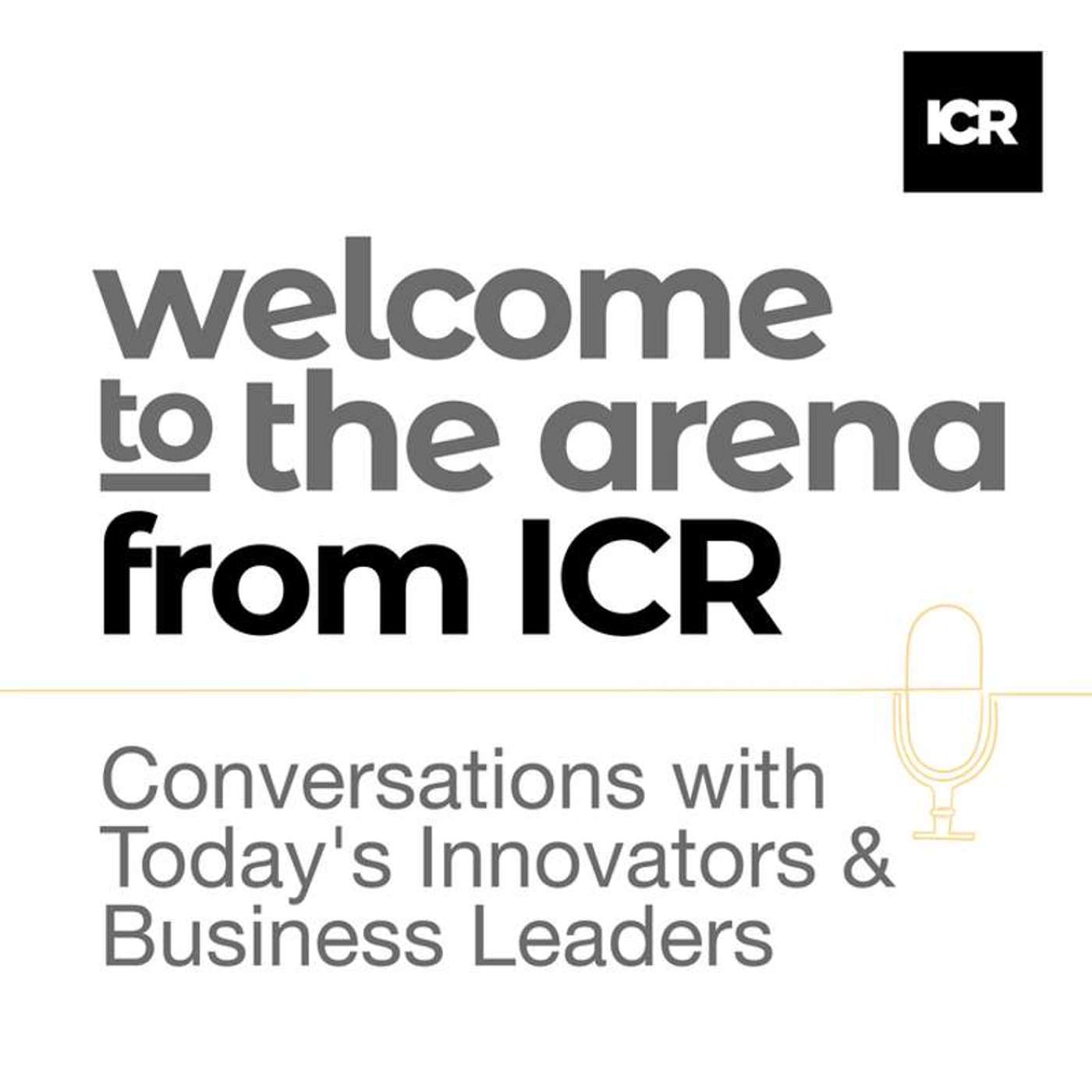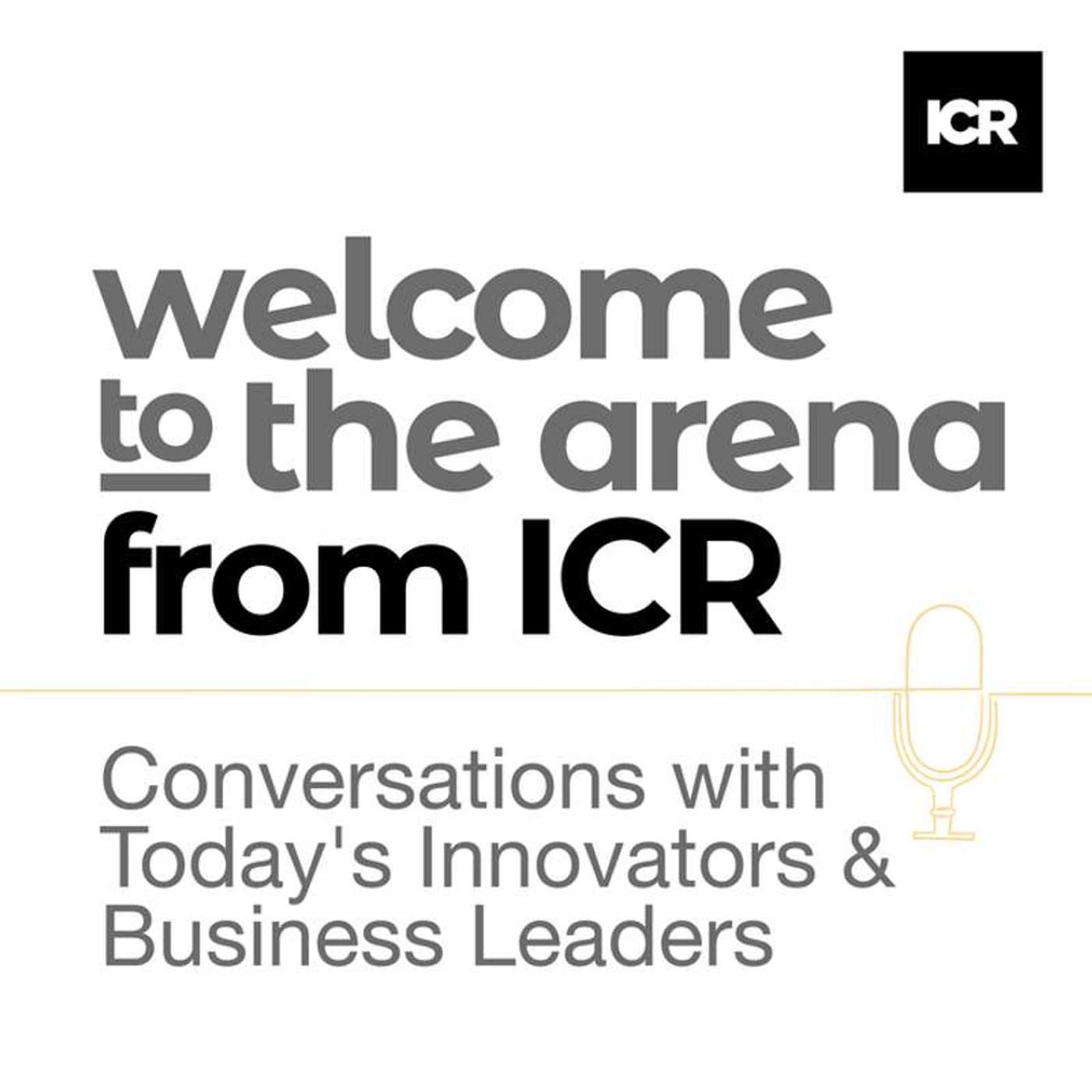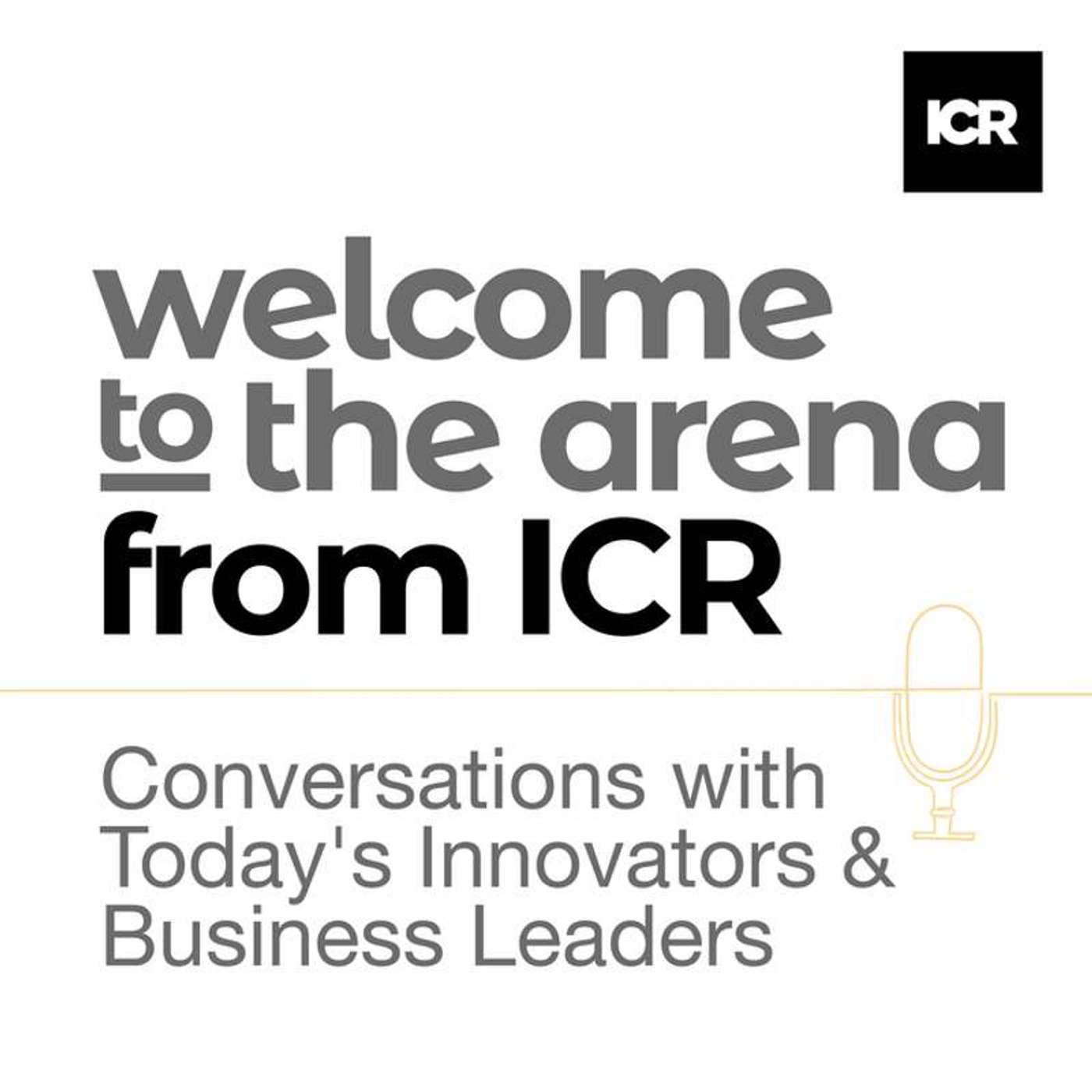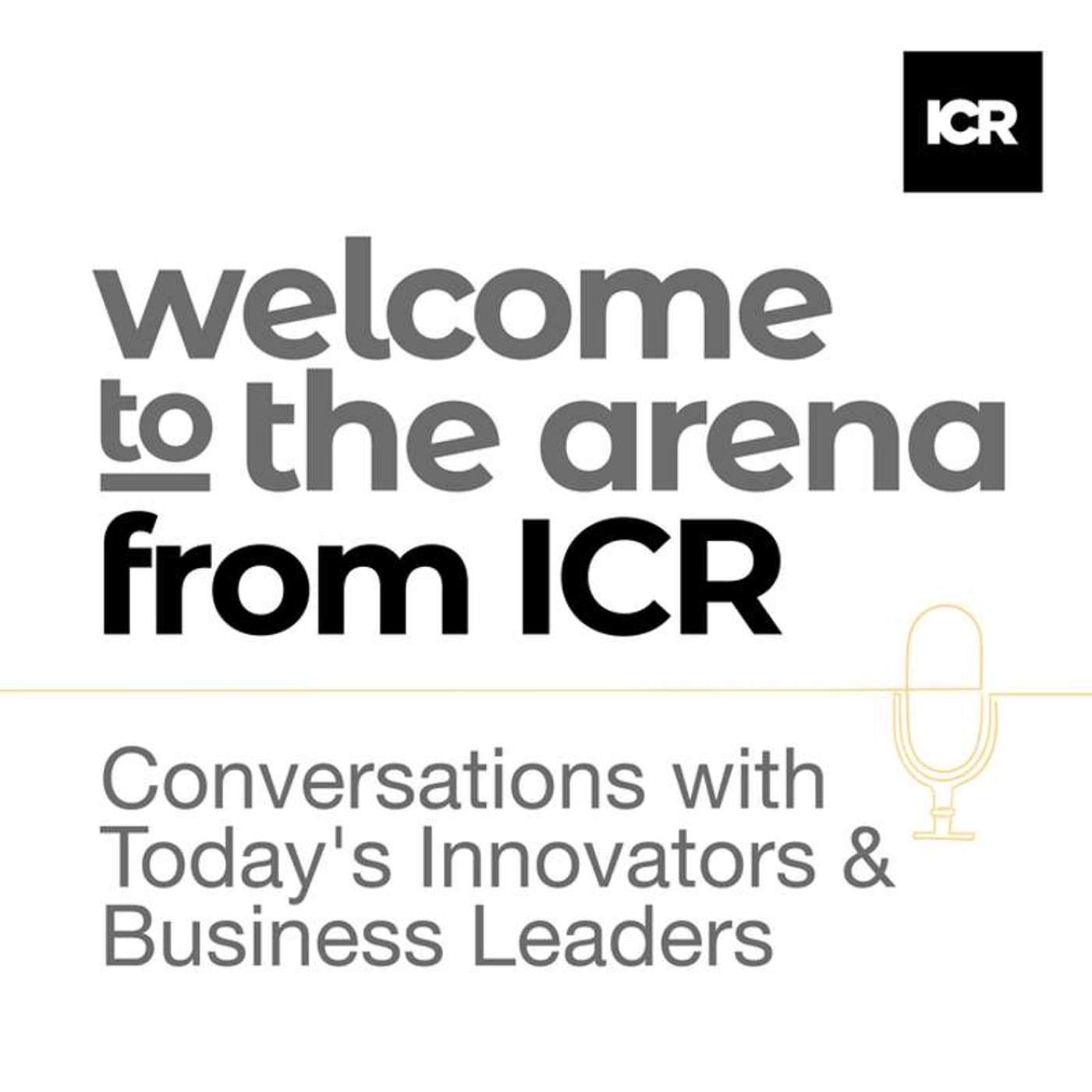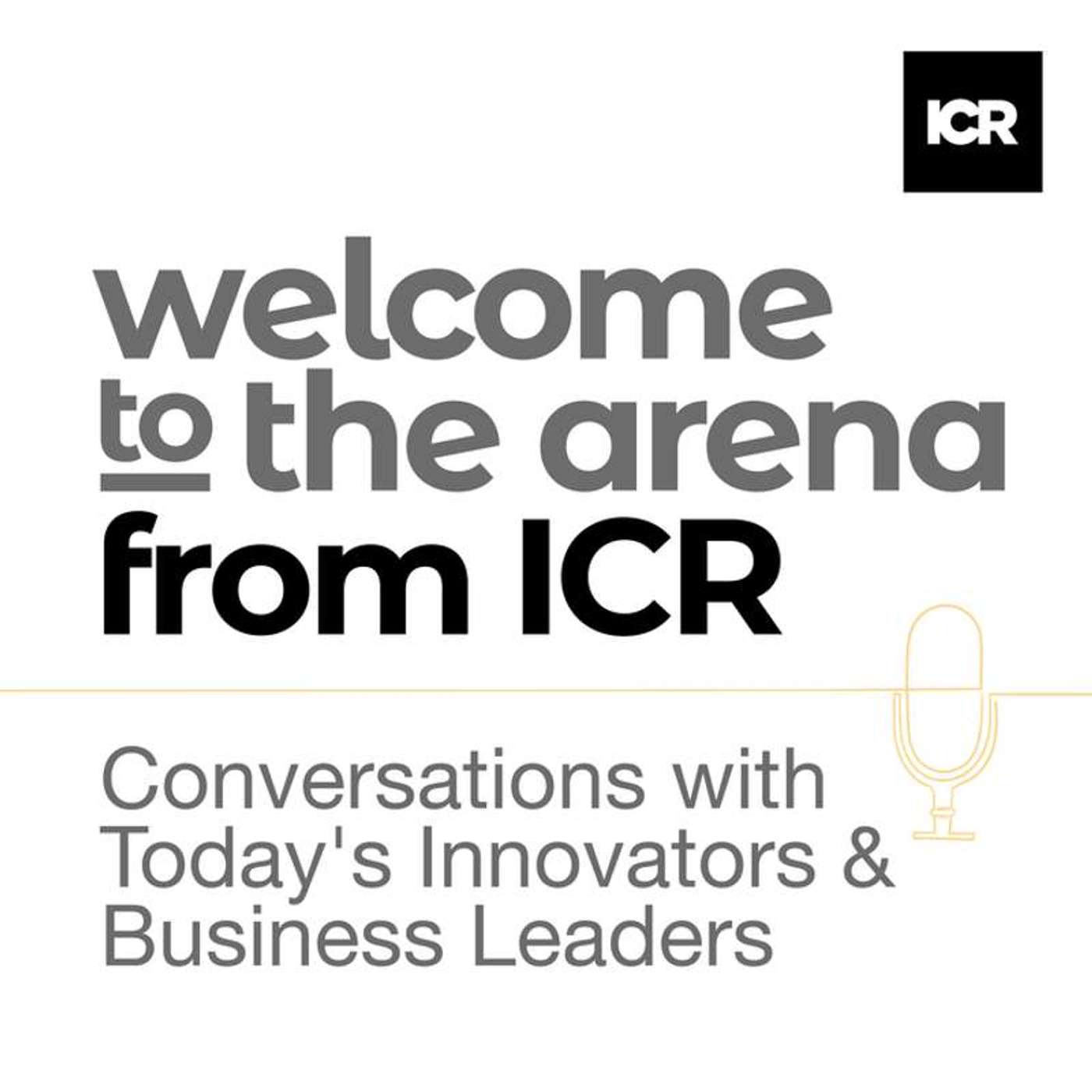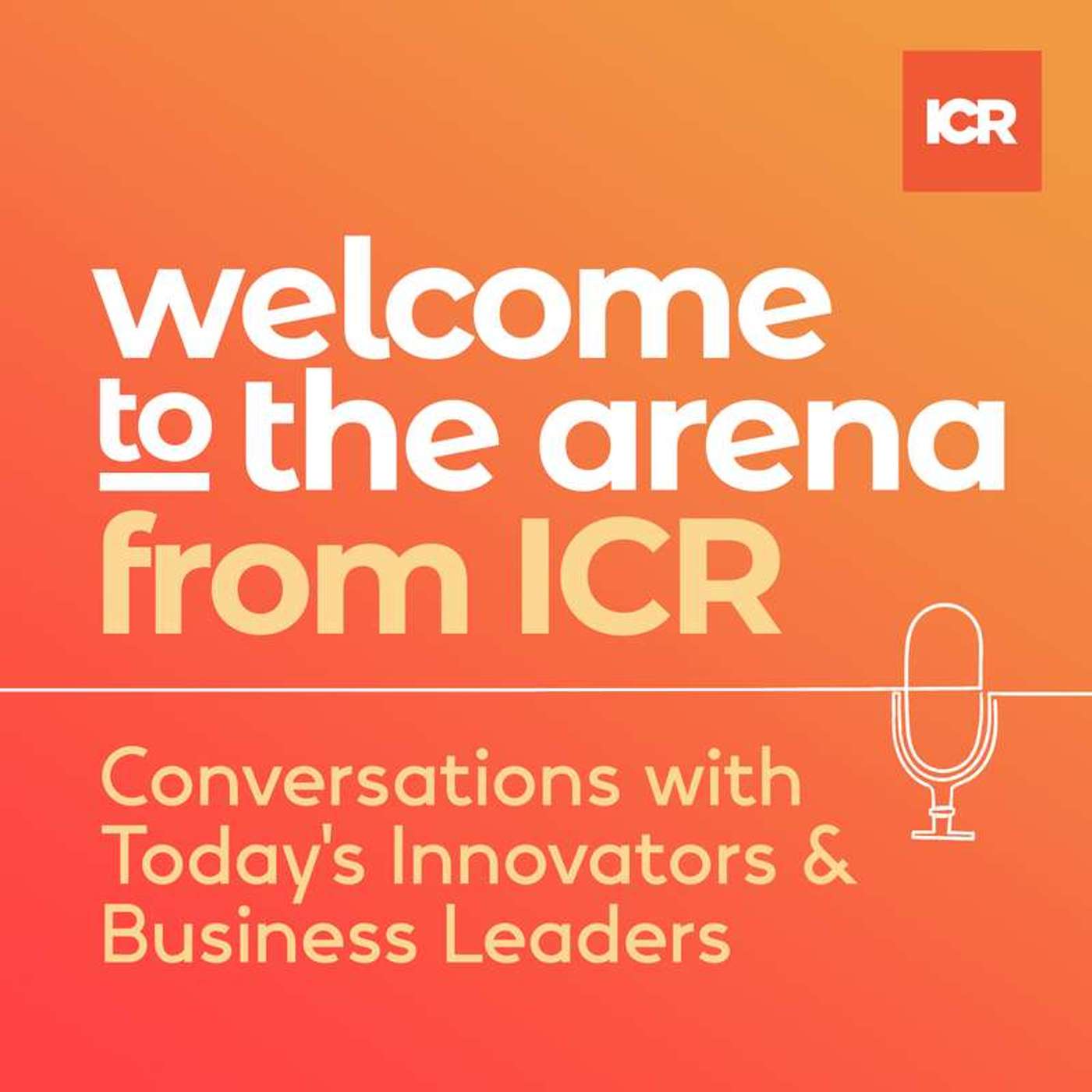Discover Welcome to the Arena from ICR – Conversations with Today's Innovators & Business Leaders
Welcome to the Arena from ICR – Conversations with Today's Innovators & Business Leaders

Welcome to the Arena from ICR – Conversations with Today's Innovators & Business Leaders
Author: ICR
Subscribed: 6Played: 89Subscribe
Share
© 2024 ICR
Description
In the increasingly crowded and competitive corporate and financial ecosystem, it’s harder than ever for companies to break through the clutter and be heard. The media, investors, agenda-driven influencers, even customers and competitors, are defining your business story on their terms. Therefore, it is imperative that companies take control and proactively drive the conversation with stakeholders in an effort to build & maintain equity value.
In Welcome to the Arena from ICR, Co-Founder & CEO of ICR, Tom Ryan, interviews key business and financial players who influence the fate of public or aspiring public companies in the capital markets. As a former Wall Street Journal ranked sell-side equity analyst and the founder of one of the largest strategic communications firms in the world, Tom understands what it takes to navigate this complex environment.
This is a forum for CEOs, CFOs, institutional investors, sell-side analysts, financial journalists, private equity professionals and other financial community participants to share their stories and give advice in an open and candid conversation.
For more information, visit http://www.icrinc.com
In Welcome to the Arena from ICR, Co-Founder & CEO of ICR, Tom Ryan, interviews key business and financial players who influence the fate of public or aspiring public companies in the capital markets. As a former Wall Street Journal ranked sell-side equity analyst and the founder of one of the largest strategic communications firms in the world, Tom understands what it takes to navigate this complex environment.
This is a forum for CEOs, CFOs, institutional investors, sell-side analysts, financial journalists, private equity professionals and other financial community participants to share their stories and give advice in an open and candid conversation.
For more information, visit http://www.icrinc.com
209 Episodes
Reverse
As 2025 comes to a close, Tom provides a recap of the biggest stories in business from the past year, talks about the value ICR continues to provide for clients, and looks ahead to what 2026 may have in store. Happy new year!
For those who might be newer to the space, Digital Asset Treasuries, or 'DATs' for short, can be a good way to start investing in crypto. Not all of these treasuries do a great job of creating value for users, but today's company uses an innovative model that includes several different strategies for yield generation.Patrick Horseman is the Chief Investment Officer at BNB Plus, a digital asset treasury company that trades under the symbol BNBX. The company unlocks institutional-grade access to the Binance ecosystem through non-directional yield strategies and long BNB exposure. Patrick has been the founder or co-founder of several hedge funds and businesses operating in the world of decentralized finance, including Coral Capital, Esoteric Strategies, and Innovation Shares. He's also the founder of Verified Organics, an Ethereum based blockchain application designed to bring transparency and accountability to the organic food production process from farm to table.Today, we get into BNB Plus' different yield generation strategies, what makes the Binance ecosystem unique, and the general state of the DAT market now that some of the initial euphoria seems to have waned.Highlights:Patrick's path into DeFi (2:15)The BNB Plus Mission (5:48)DeFi Explained (8:34)What makes Binance unique? (10:24)Patrick's BNB Optimism (14:35)BNB Plus' Yield Generation Strategies (16:14)The BNB Plus Team (22:11)Binance's potential impact in the US (24:48)The state of the DAT market (25:34)BNB Plus' approach to risk (29:15)Links:Patrick Horsman LinkedInBNB Plus LinkedInBNB Plus WebsiteICR LinkedInICR TwitterICR WebsiteFeedback:If you have questions about the show, or have a topic in mind you'd like discussed in future episodes, email our producer, joe@lowerstreet.co.
In this country, health outcomes are too often dictated by your ZIP code, but one company is working very hard to fix those inequities.Demond Martin, is the CEO and co-founder of WellWithAll, a health and wellness company dedicated to advancing health equity for underserved communities. Operating under ‘inclusive capitalism’, WellWithAll reinvests 20% of its profits into health initiatives tailored to specific community needs, tackling health disparities, and ensuring a targeted approach to wellness.Before WellWithAll, Demond was a senior partner at Adage Capital Management, where he invested in the consumer sector for 21 years. Earlier in his career, he served in the Clinton administration, and he has served on numerous nonprofit boards, including the Berkeley College of Music, The Dana-Farber Cancer Institute, and the Obama Foundation. Today, we get into what WellWithAll does, how they're giving back to the community, and Demond's journey from a trailer in North Carolina to CEO of this incredible company.Highlights:Demond's background (2:21)Stories from the White House (3:50)Working at a hedge fund (5:58)Lessons about investing (8:32)The origins of WellWithAll (11:42)Health inequities (13:54)How WellWithAll has evolved (15:08)Getting in with large retailers (17:08)Sources of funding (18:57)The Obama Foundation (20:19)A career in politics? (21:00)Demond's mentors (22:14)27th ICR Conference (24:04))Links:Demond Martin LinkedInWellWithAll LinkedInWellWithAll WebsiteICR LinkedInICR TwitterICR WebsiteFeedback:If you have questions about the show, or have a topic in mind you'd like discussed in future episodes, email our producer, joe@lowerstreet.co.
This week, another trip down memory lane as we revisit an episode from April with Dan Galpern, the CEO of DanceOne, who's managed to harness the explosion of interest in dance, into a thriving global brand. Summary: We may not talk about them the same way we talk about basketball or baseball players, but make no mistake, dancers are elite athletes. Their training is intense, and the competition is fierce. And with Breakdancing at the Olympics, dance content flooding TikTok, and dance competition shows all over TV, there's never been more interest in the art-form. So how do you take that global phenomenon, and harness it into a global business? Dan Galpern is the CEO of DanceOne. In 2023, the company was formed out of the merger between Break The Floor Productions and Star Dance Alliance, and it has become the premier producer of educational and competitive dance events, as well as the largest family of dance brands in the world. Dan joins us to discuss DanceOne's plans for future expansion and growth, and how their global community is raising up the next generation of world-class dancers. Highlights:The origins of DanceOne (3:48)Path from investor to CEO (5:41)DanceOne infrastructure (6:46)Building the DanceOne experience (8:11)The global appeal of dance (9:20)DanceOne event offerings (10:30)Growth opportunities (11:43)The power of dance (15:29)The DanceOne community (17:52)Goals for the future (20:00)Links:Dan Galpern LinkedInDanceOne LinkedInDanceOne WebsiteICR LinkedInICR TwitterICR Website Feedback:If you have questions about the show, or have a topic in mind you'd like discussed in future episodes, email our producer, joe@lowerstreet.co.
This week we're once again dipping into the archive, and revisiting an episode we released in May with Adam Goldenberg, CEO and Co-Founder of Fabletics. Adam has been an entrepreneur since the age of 16, and he shares what decades of experience have taught him about building a successful brand. Summary: When you're shopping for clothes, there's a checklist of things you look for: you want them to look and feel good, you want them to last a long time, you might want them ethically and sustainably sourced, and probably most importantly, you don't want them to break the bank. In 2011 one active wear company emerged that ticked pretty much all those boxes. Adam Goldenberg is the CEO and Co-Founder of Fabletics. Adam is a seasoned entrepreneur and leader in the e-commerce industry with a proven track record of building multiple-billion dollar brands. In fact, alongside co-founder Don Ressler, Adam has generated over $10 billion dollars in sales through his company, TechStyle Fashion Group, which in addition to Fabletics, has launched other digitally-native fashion brands like Savage X Fenty, Just Fab, Fab Kids, Shoedazzle and Yitti. Adam launched his first company at 16, at 19 he became the youngest ever COO of a public company. He joins us to share his thoughts on e-commerce, customer retention, sustainability, and opportunities to grow the Fabletics brand. Highlights:Fabletics origins (2:50)Fabletics' customer base (4:48)Tech and personalization (5:55)Celebrity partnerships (7:32)Membership model (8:37)E-commerce vs. Brick and mortar retail (11:23)Amazon (13:54)Plans for growth (15:27)Sustainability (19:09)Lesson's learned (20:58)What's next for Fabletics (23:19)Links:Adam Goldenberg LinkedInFabletics LinkedInFabletics WebsiteICR LinkedInICR TwitterICR Website Feedback:If you have questions about the show, or have a topic in mind you'd like discussed in future episodes, email our producer, joe@lowerstreet.co.
Today, we're hopping back into the archive and revisiting an episode with Gerard Barron, the co-founder, CEO, and chairman of The Metals Company, who joined us to discuss the company’s plans to harvest critical metals off the sea floor. Summary:The Trump administration has made American reindustrialization a top priority, but to do that, the US is going to need access to an abundance of metals like copper, manganese and nickel. The challenge then is to find a way to source these materials that doesn't rely on Chinese supply chains, and won't lead to serious environmental harm.Gerard Barron is the co-founder, CEO and chairman of The Metals Company, which trades on the Nasdaq under the symbol TMC. The Metals Company mission is to harvest and process metal-containing nodules from the sea floor, providing a clean and abundant source of raw materials for an array of critical industries, like steelmaking and EV production. Gerard walks us through the evolution of TMC, their groundbreaking tech, and some recent regulatory breakthroughs that have brought them closer to achieving their goals than ever before.Highlights:The Metals Company Mission (2:07)The history of seabed harvesting (3:43)Land-based supply chains (7:17)TMC's tech (10:44)Regulatory roadblocks (12:28)Defense implications (15:51)EVs (17:37)Korea Zinc deal (19:41)Looking ahead (21:34)PE Involvement (24:22) Links:Gerard's LinkedInThe Metals Company LinkedInThe Metals Company WebsiteICR LinkedInICR TwitterICR Website Feedback:If you have questions about the show, or have a topic in mind you'd like discussed in future episodes, email our producer, Joe@lowerstreet.co.
Across the United States, discarded food too often ends up just rotting in landfills. But one company in California is harnessing the power of data to make sure those valuable nutrients don't go to waste.Clemens Stockreiter is the Founder and CEO of RE:CIRCLE Solutions, a company transforming pre-consumer food byproducts into sustainable animal feed ingredients. He's spent more than two decades leading recycling and circular economy businesses, including as CEO of PreZero US and CFO of Sky Plastic Group. Today, Clemens joins us to break down how RE:CIRCLE is using science and technology to close the loop on food waste, and build data-driven circular food economies. Highlights:What does RE:CIRCLE do? (1:43)Complexity of organics recycling (2:57)RE:CIRCLE's Ontario Facility (3:59)De-packaging (4:57)California sustainability requirements (5:47)RE:CIRCLE's TraceOS system (7:19)Convincing grocers to participate (8:48)Dealing with different types of food waste (9:43)'Copy and Paste Scalability' (11:03)What's next for RE:CIRCLE? (12:37)The future of circular waste systems (13:34) Links:Clemens' LinkedInRE:CIRCLE LinkedInRE:CIRCLE WebsiteICR LinkedInICR TwitterICR Website Feedback:If you have questions about the show, or have a topic in mind you'd like discussed in future episodes, email our producer, joe@lowerstreet.co.
Please enjoy the second part of our conversation with Maja Vujinovic where we break down staking, the evolving crypto regulatory environment, and how the emergence of AI could influence blockchains. Maja is the CEO of Digital Assets at FG Nexus, which trades under the symbol FGNX and specializes in ETH accumulation, yield generation and real-world asset tokenization. She's been a pioneer in financial innovation for nearly two decades and helped shape the crypto industry from its earliest days.Part 1 came out last week, and you might want to go back and listen if you haven't already, especially if you don’t have a strong understanding of crypto and blockchain technology. Highlights:How does staking work? (2:00)How regulation is evolving (5:28)Geopolitical impacts (7:57)How will AI impact blockchains? (11:11)What it's like being a crypto expert (14:10)What sets FG Nexus apart? (15:21)Links:Maja's LinkedInFG Nexus LinkedInFG Nexus WebsiteICR LinkedInICR TwitterICR Website Feedback:If you have questions about the show, or have a topic in mind you'd like discussed in future episodes, email our producer, joe@lowerstreet.co.
If you hear words like 'crypto', 'Ethereum' and 'Blockchain' and feel confused, you're definitely not alone. Today, we're sitting down with someone who's been in crypto since long before it became the hot new thing, and getting her insight into how it works, and why it matters. Maja Vujinovic is the CEO of Digital Assets at FG Nexus, which trades under the symbol FGNX and specializes in ETH accumulation, yield Generation and real-world asset tokenization. Maja has been a pioneer in financial innovation for nearly two decades and helped shape the crypto industry from its earliest days. Today, you'll hear part 1 of our conversation where we break down what blockchain is, the role Ethereum plays in the decentralized finance ecosystem, and how FG Nexus aims to create value for clients.Tune in next week for part 2.Highlights:Where are we in crypto’s evolution? (3:01)Maja's journey into crypto (4:49)What is Blockchain and Ethereum? (8:07)What makes Ethereum special? (10:36)How Ethereum is valued (12:12)Dollars 'on chain' (14:03)How Maja ended up at FG Nexus (15:39)FG Nexus' value creation strategy (18:08)Links:Maja's LinkedInFG Nexus LinkedInFG Nexus WebsiteICR LinkedInICR TwitterICR Website Feedback:If you have questions about the show, or have a topic in mind you'd like discussed in future episodes, email our producer, joe@lowerstreet.co.
It's officially fall, and that means we're deep into the MLB playoffs, and the NHL, NFL and NBA seasons are in full swing. With it being such an exciting time for professional sports, we thought it'd be an opportune moment to revisit an episode we recorded in April, where Doug Perlman, CEO of Sports Media Advisors, demystifies the complex process of negotiating league media rights. We hope you enjoy this fascinating look into the evolution of sports media licensing in a post-cable world. Summary: Major sporting events used to be clustered among a handful of TV channels. Now following your favourite team might require subscriptions to a whole litany of cable and streaming services. Which is to say nothing of all the licensed content you'll find spread out across social media platforms. In such a complex media ecosystem, how do organizations even begin to think about licensing their media assets? And how do they calculate their worth?Doug Perlman is the founder and CEO of Sports Media Advisors. SMA advises sports properties on their media strategies and rights negotiations. Doug has negotiated tens of billions of dollars in rights fees for some of the largest sports properties in the world, including the NFL, NASCAR, US Soccer, and the Ryder Cup, among others. Doug joins us today to discuss recent trends like the rise of streaming, the popularization of sports betting, and the emergence of AI, and all the unique challenges and opportunities they present for different leagues and organizations.Highlights:Doug's early career (3:00)Working for the NHL (4:40)Founding SMA (7:53)SMA's services (9:31)Negotiating rights deals (13:55)Cord-cutting (17:16)Impact of sports betting (18:35)Women's sports (19:37)AI in sports (20:58)Advice for young people trying to work in sports (26:12)Links:Doug Perlman LinkedInSMA LinkedInSMA WebsiteICR LinkedInICR TwitterICR WebsiteFeedback:If you have questions about the show, or have a topic in mind you'd like discussed in future episodes, email our producer, joe@lowerstreet.co.
This week, we're reaching back into the archive, and re-releasing an episode from back in May with Jereme Kent, the CEO of One Power Company. Given our recent episodes focusing on AI-driven enterprises, we thought it would be a good time to revisit this episode where Jereme discusses the need for a modernized grid to power those projects. Enjoy! Summary: The world has changed a lot in the last century, but it might surprise you to learn that the US power grid has remained pretty much the same. In this country, energy is by and large controlled by regional utilities with de-facto monopolies, and no real incentive to innovate. That inertia impacts the entire economy, as industrial projects are starved of the power they need to get off the ground. Jereme Kent is the founder and CEO of One Power Company. Under his leadership, One Power is trailblazing the creation of the customer-centric power grid of the future. Before founding One Power in 2009, Jereme led the construction of some of the world's premier wind projects. As a field engineer, erection superintendent and site manager, he has overseen more than a billion dollars in wind turbine construction. Jereme joins us to discuss how and why current US power infrastructure is falling short, and how the One Power model could both energize and decarbonize America's efforts to re-industrialize. Highlights:The state of the grid (3:09)Why we need fixes now (7:04)One Powers services (9:03)Vertical Integration (11:30)Digital Substations (13:54)Fundamental Industries (15:20)Sustainability (16:55)Net Zero (19:45)10 year outlook (21:02)Culture of innovation (23:36)One Power's priorities (25:30)Links:Jereme Kent LinkedInOne Power LinkedInOne Power WebsiteICR LinkedInICR TwitterICR Website Feedback:If you have questions about the show, or have a topic in mind you'd like discussed in future episodes, email our producer, joe@lowerstreet.co.
When you're running a large industrial operation, tracking all of the elements of your process to know where they are and what they're doing in real-time, can be a huge challenge. Today, we're spotlighting a company whose revolutionary platform can help solve that problem. Ed Nabrotzky is the CEO and co-founder of Dot Ai, a company specializing in industrial asset intelligence solutions. Ed brings with him over 25 years of experience in technology development, and has held executive leadership roles at large public enterprises, including Molex and Panasonic. Ed joins us to discuss Dot Ai's competitive advantage, how AI is changing the game when it comes to asset intelligence, and how their tech helps make companies more efficient. Highlights:What Dot Ai does (1:53)The gap in the market (2:25)The customers (3:21)Inflection point (4:01)The current emphasis asset intelligence (5:51)ROI (7:09)The Dot Ai platform (8:36)Data Security (12:04)Meeting Unique Client Needs (13:25)R&D (14:40)Puerto Rico Manufacturing (16:15)SPAC (18:49)Forces reshaping supply chains (22:59)Misconceptions about automated asset tracking (25:04)Future outlook (26:10) Links:Ed's LinkedInDot Ai LinkedInDot Ai WebsiteICR LinkedInICR TwitterICR Website Feedback:If you have questions about the show, or have a topic in mind you'd like discussed in future episodes, email our producer, joe@lowerstreet.co.
Summary:In today's medical system, getting a proper diagnosis and course of treatment can take ages, with potentially disastrous consequences for your health. Today, we're spotlighting a company that's trying to change that paradigm, using the power of AI. George Tomeski is the CEO of Helfie.ai, a company whose platform will allow you to assess a whole host of health conditions using only your smartphone. And they hope to bring that ability to billions of people around the world who have historically lacked access to proper medical care. In this episode, we get into the fascinating origins of Helfie.ai, the company's groundbreaking tech, and George's thoughts on AI's evolving role in the healthcare sector.Highlights:George's professional journey (2:18)Origin of Helfie.ai (3:32)The people healthcare is leaving behind (5:45)How Helfie.ai works (7:28)Working with healthcare orgs (9:53)Next steps after disease identification (10:58)Choosing which diseases to tackle (13:15)Building the algorithm (14:19)Partnerships (17:35)Helfia.ai funding (18:33)The leadership team (19:41)Thoughts on the future of AI in healthcare (20:49)What's on the horizon for Helfie.ai (24:10)Links:George's LinkedInHelfie.ai LinkedInHelfie.ai WebsiteICR LinkedInICR TwitterICR WebsiteFeedback:If you have questions about the show, or have a topic in mind you'd like discussed in future episodes, email our producer, joe@lowerstreet.co.
Summary: Since the 1980s, beloved children's clothing brand Hanna Andersson has been delivery quality and durability to happy customers. Now, Aimée Lapic leads the company as CEO and is using her deep experience in apparel, retail, and omnichannel marketing to turn the legacy brand into a digital powerhouse. Today, they're building on their long-standing strengths with innovative products and services designed to give families even more reason to return to Hanna generation after generation. Aimée joins us to share the strategies, both old and new, that have helped Hanna Andersson nurture decades of dedicated customers, and to explain how every decision connects back to the brand's mission of championing childhood. Highlights:Hanna Andersson's evolution over four decades (3:27)What opportunity did Aimée see at Hanna? (5:01)Hanna's brand mission to champion childhood (7:12)Why committing to quality earns customer loyalty (9:07)Innovations at Hanna Andersson (13:03)Introducing new fabrics, prints, and styles (15:00)Turning customers into brand ambassadors (22:32)Community connection (23:26)Collaborations and partnerships (25:18)Up next at Hanna Andersson (27:11) Links:Aimée Lapic LinkedInHanna Andersson LinkedInHanna Andersson WebsiteICR LinkedInICR TwitterICR WebsiteFeedback:If you have questions about the show, or have a topic in mind you'd like discussed in future episodes, email our producer, joe@lowerstreet.co.
When John O'Donnell founded Johnnie-O in 2005, his goal was to create a brand that combined East Coast prep with West Coast surf culture. 20 years later, you'll find their surfer logo in golf pro-shops and menswear stores across the country.Today, John joins us to share his incredible journey from being a walk-on on the UCLA golf team to founding one of America's most iconic golf brands.We get into the origins of Johnnie-O, discuss the source of their customer loyalty, and talk about their impressive growth over the last two decades.Highlights:The opportunity John saw in 2005 (2:05)John's midwest roots (4:46)UCLA Golf team (5:50)Johnnie-O's differentiation (6:45)The origins of Johnnie-O (8:17)Distribution (9:28)Inflection point for the brand (10:28)Marketing evolution (11:37)Scale of growth (13:57)Breaking into women's wear (16:30)Avenues for growth (17:35)Tariffs (18:30)Outlook for Johnnie-O (20:27)Competitive Landscape (22:15)Lessons learned (23:13) Links:Johnnie-O LinkedInJohnnie-O WebsiteICR LinkedInICR TwitterICR Website Feedback:If you have questions about the show, or have a topic in mind you'd like discussed in future episodes, email our producer, joe@lowerstreet.co.
Issuing convertible derivatives can be a great way for companies to raise capital, but issuance can be complex and daunting. Today's guest, Syed "Raj" Imteaz, has made a career out of demystifying that process.Raj is the head of ICR's Convertible and Equity Derivatives Advisory. During his career at ICR, Barclays and Lehman Brothers, he has worked on more than 200 convertible and equity derivatives transactions, totalling over $125 billion in deal value. Raj joins us to discuss the state of the convert market, the importance of receiving unbiased advice, and the incredible ROI he and his team are able to provide clients.Highlights:The importance of convertible and equity derivatives advisors (2:24)How Raj's team helps companies save money (4:16)The power of the ICR platform (7:16)The importance of unbiased advice (11:50)What's behind the booming convert market? (15:09)Why some firms shy away from converts (18:13)Factors influencing the future convert market (20:18)Links:Syed "Raj" Imteaz LinkedInICR Convertible and Equity Derivatives AdvisoryICR LinkedInICR TwitterICR WebsiteFeedback:If you have questions about the show, or have a topic in mind you'd like discussed in future episodes, email our producer, joe@lowerstreet.co.
Ziosk's pioneering pay-at-the-table solutions mean that customers at their partner restaurants are never stuck waiting for the bill. And now they're working to leverage their treasure trove of data to boost efficiency and improve customer experience, in ways that go far beyond payment. Rhonda Levene is the CEO of Ziosk, a leading digital hospitality platform serving major restaurant brands such as Chili's, Texas Roadhouse, and Red Robin. Since joining Ziosk in 2020 and being appointed CEO in 2024, Rhonda has spearheaded the company's transformation into a SaaS driven enterprise.Rhonda joins us to break down Ziosk's slate of products, their approach to innovation, and tech's evolving role in the future of the restaurant sector. Highlights:Rhonda's career path (2:17)Ziosk's Services (5:52)The scale of Ziosk usage (7:21)ROI for partners (8:41)Pivot to SaaS (11:10)Leveraging Data (12:39)Ziosk's approach to Innovation (14:34)Total addressable market (19:56)Lessons learned as CEO (21:44)Mentorship's role in Rhonda's career (22:42)Finance and leadership (24:46)Future outlook (25:47) Links:Rhonda's LinkedInZiosk LinkedInZiosk WebsiteICR LinkedInICR TwitterICR Website Feedback:If you have questions about the show, or have a topic in mind you'd like discussed in future episodes, email our producer, joe@lowerstreet.co.
Summary:a.k.a. Brands have seen incredible success bringing their digitally native brands into the physical marketplace. A big part of that success comes from their 'test and repeat' retail strategy, which allows them to gauge and adapt to consumer trends extremely quickly. Ciaran Long has been serving as the CEO of a.k.a brands for more than two years. He was previously CFO at Samsclub.com, and held other leadership positions at Walmart's e-commerce division, as well as at CBS, CNET Networks and KPMG.Ciaran joins us to break down the test and repeat strategy, and explains why it can be so effective at minimizing guesswork and mitigating risk. He also delves into a.k.a. Brands' unique approach to influencer marketing, their strategy when it comes to M & A, and the philosophy that will guide their expansion efforts in the years to come. Highlights:The a.k.a. Brands portfolio (2:05)What sets a.k.a apart? (3:12)a.k.a.'s evolution (4:43)Expansion strategy (5:50)Dealing with fickle consumers (8:56)Test and Repeat (10:55)Culture Kings (13:39)Navigating volatility (16:02)Sustainability in fashion (17:37)M&A (18:53)Looking ahead (21:06)Links:Ciaran's LinkedIna.k.a. Brands' LinkedIna.k.a. Brands' WebsiteICR LinkedInICR TwitterICR WebsiteFeedback:If you have questions about the show, or have a topic in mind you'd like discussed in future episodes, email our producer, joe@lowerstreet.co.
Summary: There are a lot of different brands fighting for market share in the "polished" segment of the restaurant industry. To stand out, you need to offer great food, at great value, in a great atmosphere. But above all, you need to make sure you have the right people at your side.And if anyone knows the value of people, it's Steve Kislow, the CEO of Firebirds wood-fired Grills. Since joining the Firebirds team in 2003, Steve has helped open dozens of locations, as the brand has grown from three restaurants in two states to 60 plus locations in 22 states.Steve joins us to talk about Firebirds' approach to innovation, their commitment to customer experience, and their plans to expand their reach even further in the coming years. He also discusses the emphasis Firebirds places on always hiring the best.Highlights:Path from chef to CEO (2:23)Firebirds' niche (4:27)How Covid Changed Things (6:44)Menu Innovation (8:17)AUVs (11:18)Price Adjustments (12:37)Growth Strategy (13:41)Changes to 'The Box' (15:48)Growing While Preserving Quality (16:58)Changes in Consumer Behavior (19:10)Approach to Technology (21:41)Evolution of the Corporate Culture (22:49)10 Year Outlook (24:09)Favorite Dishes (25:34)Links:Steve's LinkedInFirebirds LinkedInFirebirds WebsiteICR LinkedInICR TwitterICR WebsiteFeedback:If you have questions about the show, or have a topic in mind you'd like discussed in future episodes, email our producer, joe@lowerstreet.co.
It's been nearly a year since we sat down with Andy Goldberg, the CEO of PCH media, to discuss how the company has successfully navigated more than 40 years of shifts in the media industry. A lot has changed since we spoke, which in a way, makes this conversation all the more relevant. We hope you enjoy, and we'll be back with a fresh episode next week. Summary: Longevity in any business is something to celebrate, but when a media company can successfully evolve through several decades of seismic shifts, it's also a huge lesson in the art of pivoting. Today's guest has navigated through 41 years of change and his company has come through stronger than ever.We're sitting down with Andy Goldberg, CEO of PCH Media. Andy is leading PCH's multi-year transformation as the company continues to pivot from direct-to-consumer retail towards an identity and data-driven advertising business. This includes a concerted effort to attract and hire top media talent to align with the company's new focus. The company is aimed at creating incremental shareholder value based on PCH's unique value exchange and unparalleled ability to generate peer audience authentication, permission first-party data, and tremendous user engagement.Andy has led the company through several successful evolutions via acquisitions in the online search, casual games, and mobile advertising markets. In addition to being CEO, he's also Chairman of the Board of Directors and a past member of the Board of Directors and Executive Committee of the Direct Marketing Association.Recognized for excellence in the industry, Andy has been honored with the Silver Apple Award from the Direct Marketing Club of New York. He earned a BS in Marketing from the Wharton School at UPenn.Highlights:PCH's background and history (3:16)How Andy got involved at PCH and his path to leading transformation initiatives (4:43)User base and engagement at PCH (7:50)The value of PCH's audience and engagement data to marketers and advertisers (9:02)How PCH partners with clients to help them build their databases (13:24)The differences between zero, first, and third-party data (14:47)Andy's take on the discussion around depreciating third-party cookies (16:39)PCH's marketing collaborations with third-party players (19:12)The role of AI in the evolution of PCH (20:39)Andy's outlook on future goals and opportunities for PCH (22:31)Links:Andy Goldberg on LinkedInPublishers Clearing House on LinkedInPublishers Clearing House WebsiteICR LinkedInICR TwitterICR WebsiteFeedback:If you have questions about the show, or have a topic in mind you'd like discussed in future episodes, email our producer, joe@lowerstreet.co.


